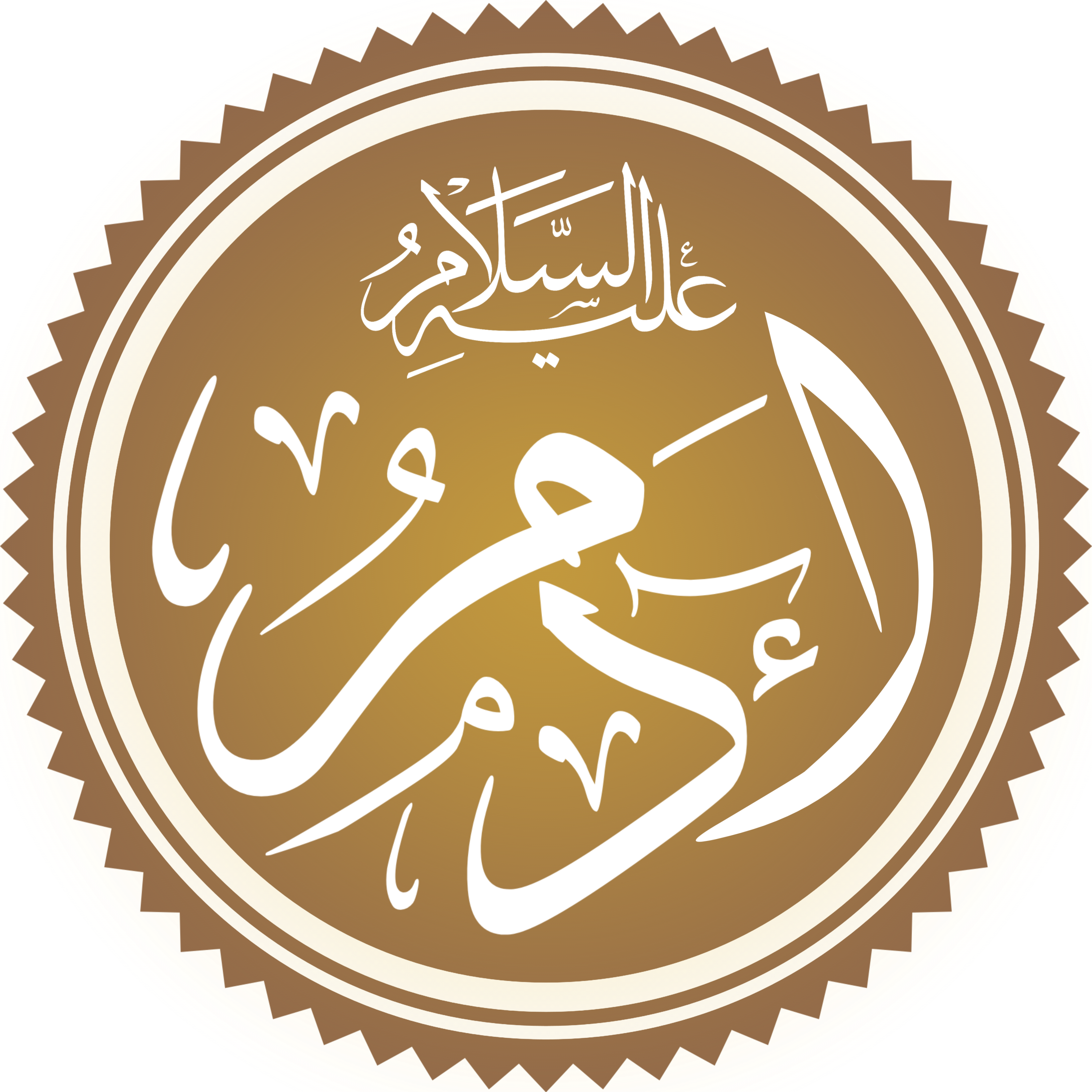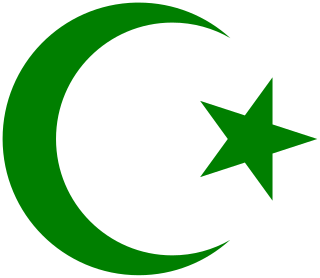This article needs additional citations for verification .(February 2016) (Learn how and when to remove this template message) |
Salihat is an Islamic term for just deeds, one of the overarching themes in the early Meccan Suras of the Qur'an.
This article needs additional citations for verification .(February 2016) (Learn how and when to remove this template message) |
Salihat is an Islamic term for just deeds, one of the overarching themes in the early Meccan Suras of the Qur'an.

Allah is the Arabic word for God in Abrahamic religions. In the English language, the word generally refers to God in Islam. The word is thought to be derived by contraction from al-ilāh, which means "the god", and is related to El and Elah, the Hebrew and Aramaic words for God.

Jinn, also Romanized as djinn or Anglicized as genies, are supernatural creatures in early pre-Islamic Arabian and later Islamic mythology and theology. Like humans, they are created with fitra, neither born as believers nor as unbelievers, but their attitude depends on whether or not they accept God's guidance. Since jinn are neither innately evil nor innately good, Islam was able to adapt spirits from other religions during its expansion. Jinn are not a strictly Islamic concept; rather, they may represent several pagan beliefs integrated into Islam.

Hindus are persons who regard themselves as culturally, ethnically, or religiously adhering to aspects of Hinduism. Historically, the term has also been used as a geographical, cultural, and later religious identifier for people living in the Indian subcontinent.

Iblīs is a figure frequently occurring in the Quran, commonly in relation to the creation of Adam and the command to prostrate himself before him. After he refused, he was cast out of heaven. For many classical scholars, he was an angel, but regarded as a jinn in most contemporary scholarship. Due to his fall from God's grace, he is often compared to Satan in Christian traditions. In Islamic tradition, Iblis is often identified with Al-Shaitan. However, while Shaitan is used exclusively for an evil force, Iblis himself holds a more ambivalent role in Islamic traditions.

Mary was a first-century BC Galilean Jewish woman of Nazareth, and the mother of Jesus, according to the New Testament and the Quran.

Ash'arism or Ashʿari theology is the foremost theological school of Sunni Islam which established an orthodox dogmatic guideline based on clerical authority, founded by the Arab theologian Abu al-Hasan al-Ashʿari. The disciples of the school are known as Ashʿarites, and the school is also referred to as the Ashʿarite school, which became the dominant theological school within Sunni Islam. It is considered one of the orthodox schools of theology in Sunni Islam, alongside the Maturidi school and Athari school of theology.

Mullah is derived from the Arabic word mawlā, meaning "vicar", "master" and "guardian". However, used ambiguously in the Quran, some publishers have described its usage as a religious title as inappropriate. The term is sometimes applied to a Muslim man, educated in Islamic theology and sacred law. In large parts of the Muslim world, particularly Iran, Pakistan, Azerbaijan, Afghanistan, Eastern Arabia, Turkey and the Balkans, Central Asia, the Horn of Africa and other parts of the Indian subcontinent, it is the name commonly given to local Islamic clerics or mosque leaders.

Warith Deen Mohammed, also known as W. Deen Mohammed, Imam W. Deen Muhammad and Imam Warith Deen, was a progressive African-American Muslim leader, theologian, philosopher, Muslim revivalist, and Islamic thinker (1975–2008) who disbanded the original Nation of Islam (NOI) in 1976 and transformed it into a semi orthodox mainstream Islamic movement, the World Community of Al-Islam in the West which later became the American Society of Muslims. He was a son of Elijah Muhammad, the leader of the Nation of Islam from 1933 to 1975.

Annemarie Schimmel was an influential German Orientalist and scholar who wrote extensively on Islam and Sufism. Internationally renowned, she was a professor at Harvard University from 1967 to 1992.

A caliphate is an Islamic state under the leadership of an Islamic steward with the title of caliph, a person considered a politico-religious successor to the Islamic prophet Muhammad and a leader of the entire ummah. Historically, the caliphates were polities based on Islam which developed into multi-ethnic trans-national empires. During the medieval period, three major caliphates succeeded each other: the Rashidun Caliphate (632–661), the Umayyad Caliphate (661–750) and the Abbasid Caliphate (750–1258). In the fourth major caliphate, the Ottoman Caliphate, the rulers of the Ottoman Empire claimed caliphal authority from 1517. During the history of Islam, a few other Muslim states, almost all hereditary monarchies, have claimed to be caliphates.

In Islam, angels are believed to be celestial beings, created from a luminous origin by God. They have different functions, including praising God in heavens, interacting with humans ordinary life, and carrying laws of nature. Islam acknowledges the concept of angels both as anthropomorphic and abstract. Belief in angels is one of the six articles of faith in Islam. The Quran is the principal source for the Islamic concept of angels, but more extensive features of angels appear in hadiths, Mi'raj literature, Islamic theology and Islamic philosophy. The angels differ from other spiritual creatures in their attitude as creatures of virtue in contrast to impure demons and morally ambivalent jinn.
Islamic views on slavery represent a complex and multifaceted body of Islamic thought, with various Islamic groups or thinkers espousing views on the matter which have been radically different throughout history. Slavery was a mainstay of life in pre-Islamic Arabia and surrounding lands. The Quran and the hadith address slavery extensively, assuming its existence as part of society but viewing it as an exceptional condition and restricting its scope. Early Islamic dogma forbade enslavement of free members of Islamic society, including non-Muslims (dhimmis), and set out to regulate and improve the conditions of human bondage. The sharīʿah regarded as legal slaves only those non-Muslims who were imprisoned or bought beyond the borders of Islamic rule, or the sons and daughters of slaves already in captivity. In later classical Islamic law, the topic of slavery is covered at great length. Slaves, be they Muslim or those of any other religion, were equal to their fellow practitioners in religious issues.

Âdam or Aadam is believed to have been the first human and nabi on Earth, in Islam. Adam's role as the father of the human race is looked upon by Muslims with reverence. Muslims also refer to his wife, Haawa, as the "mother of mankind". Muslims see Adam as the first Muslim on Earth, as the Quran states that all the Prophets preached the same faith of Islam.
Shaykh al-Islām was used in the classical era as an honorific title for outstanding scholars of the Islamic sciences. It first emerged in Khurasan towards the end of the 4th Islamic century. In the central and western lands of Islam, it was an informal title given to jurists whose fatwas were particularly influential, while in the east it came to be conferred by rulers to ulama who played various official roles but were not generally muftis. Sometimes, as in the case of Ibn Taymiyya, the use of the title was subject to controversy. In the Ottoman Empire, starting from the early modern era, the title came to designate the chief mufti, who oversaw a hierarchy of state-appointed ulama. The Ottoman Sheikh al-Islam performed a number of functions, including advising the sultan on religious matters, legitimizing government policies, and appointing judges. Modern times have seen the role of chief mufti carried out by grand muftis appointed or elected in a variety of ways.
Islam is an Abrahamic, monotheistic religion which teachings and beliefs are that there is only one God and Muhammad is the messenger of God. It is the world's second-largest religion with over 1.8 billion followers or 24.1% of the world's population, commonly known as Muslims. Muslims make up a majority of the population in 49 countries. Islam teaches that God is merciful, all-powerful, and unique, and has guided mankind through prophets, revealed scriptures and natural signs. The primary scriptures of Islam are the Quran, believed to be the verbatim word of God, and the teachings and normative examples of Muhammad.

In Islam, God is the absolute one, the all-powerful and all-knowing ruler of the universe, and the creator of everything in existence. Islam emphasizes that God is strictly singular ; unique ; inherently One ; and also all-merciful and omnipotent. According to Islam, God is neither a material nor a spiritual being. According to Islamic teachings, beyond the Throne and according to the Quran, "No vision can grasp him, but His grasp is over all vision: He is above all comprehension, yet is acquainted with all things."

The Islamic State of Iraq and the Levant, also known as the Islamic State of Iraq and Syria, officially known as the Islamic State (IS) and also known by its Arabic-language acronym Daesh, is a terrorist militant group and a former unrecognised proto-state that follows a fundamentalist, Salafi jihadist doctrine of Sunni Islam. ISIL gained global prominence in early 2014 when it drove Iraqi government forces out of key cities in its Western Iraq offensive, followed by its capture of Mosul and the Sinjar massacre.
Hinduism is a way of life of the Hindu people of India, their diaspora, and some other regions which had Hindu influence in the ancient and medieval times. Islam is a monotheistic religion in which the deity is Allah, the last prophet being Muhammad, whom Muslims believe delivered the Islamic scripture, the Qur'an. Hinduism mostly shares common terms with the dhārmic religions, including Buddhism, Jainism, and Sikhism. Islam shares common terms with the Abrahamic religions–those religions claiming descent from Abraham–being, from oldest to youngest, Judaism, Christianity, Islam, and Baha'i Faith.

Islamic Holy Books are the texts which Muslims believe were authored by God through various prophets throughout humanity's history. All these books, in Muslim belief, promulgated the code and laws that God ordained for those people.

Prophets in Islam are individuals who Muslims believe were sent by God to various communities in order to serve as examples of ideal human behavior and to spread God's message on Earth. Some prophets are categorized as messengers, those who transmit divine revelation through the intercession of an angel. Muslims believe that many prophets existed, including many not mentioned in the Quran. The Quran states: "There is a Messenger for every community". Belief in the Islamic prophets is one of the six articles of the Islamic faith.
| This article about Islamic studies is a stub. You can help Wikipedia by expanding it. |